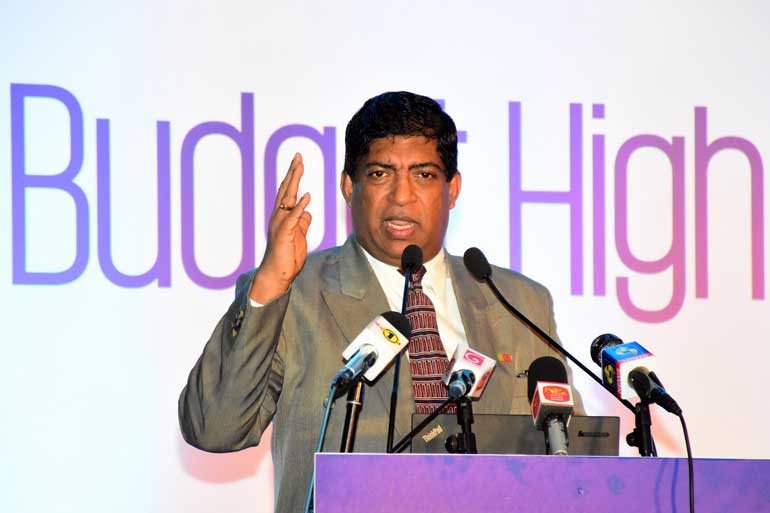Saturday Feb 21, 2026
Saturday Feb 21, 2026
Monday, 23 November 2015 00:00 - - {{hitsCtrl.values.hits}}

Finance Minister Ravi Karunanayake on Saturday issued an ultimatum to the private sector to kick-start the economy toward higher growth making use of what he described as a “progressive and supportive” 2016 Budget.
“We looked at the best case scenario and the 2016 Budget has progressive proposals on services, agriculture and industry. We have opened up new opportunities. What more can we give,” said Karunanayake during his comments at KPMG’s post-Budget Forum on Saturday.
“If the private sector cannot kick-start their business from here, they shouldn’t be in business. The 2016 Budget is a wakeup call and if the private sector cannot wake up, they can sleep forever. We need to put the country on the move,” added the chartered accountant-turned Finance Minister who is an alumnus of KPMG. The Unity Government’s maiden Budget has been widely hailed as business friendly and Karunanayake also urged foreign investors by saying, “This is your turn” and added that Budget 2016 had given the Sri Lankan private sector a head start and it was the ideal time for foreign investors to partner Sri Lankans.
He said both the private sector and foreign investors could make Sri Lanka take off using the range of proposals and new opportunities offered in the 2016 Budget.
The Finance Minister acknowledged that the country had overtaxed the people but the 2016 Budget had corrected the situation and the private sector has been given the best opportunities now.
Assuring swift implementation of all proposals, Finance Minister Karunanayake also said: “I will stand by and move with the private sector. Sri Lanka needs to be on the move to catch up lost time.”
Ravi K...
He cautioned that if the private sector doesn’t make use of the new opportunities, foreigners would and if the latter also ignored the opportunity, the Government would seize the moment. However, pointing to the record high public investment, he said, “When the Government spends, the private sector spends ten times more.”
The Finance Minister said that the positive Budget was made possible with the vision of President Maithripala Sirisena, a hands-on Prime Minister Ranil Wickremesinghe and a very business oriented Cabinet. He also credited the private sector, professionals and civil society for submitting nearly 1,500 proposals.
KPMG Managing Partner Reyaz Mihular described the 2016 Budget as “development oriented” and noted that since there were so many things “packed in it” there could be some unintended consequences. However, he said these could be resolved whilst implementation will be key.
The KPMG Forum included a panel discussion and Central Bank Deputy Governor Dr. Nandalal Weerasinghe said that the 2016 Budget was very positive from a monetary policy, exchange rate, Balance of Payments and macro-economic perspective.
Ceylon Chamber of Commerce Chairman Samantha Ranatunga described the 2016 Budget as “forward thinking and development oriented” and the private sector would be required to reform and position itself to make use of the opportunities. He credited the supportive Budget for excellent engagement and dialogue between Finance Minister and the private sector.
Inland Revenue Chief Kalyani Dahanayake said the 2016 Budget had adopted a “revolutionary” approached in terms of boosting revenue whilst instilling financial discipline, which is key for private sector growth.
“This Budget empowers growth and if the private sector grows, our revenue will increase as well,” she added.
NDB Director and CEO Rajendra Theagarajah also welcomed the wide range of proposals in the financial services sector as well as in other sectors. However, he suggested some improvements as well as amendments. It was pointed out that PAYE relief leading to a new emerging middle class clearly offers a fresh opportunity for the banking sector.
Hayleys Plc Chief Economist Deshal de Mel commended the Budget for its focus on education at all levels and the direction given for a greater private sector role and fillip for exports as well as entrepreneurship. He noted that revenue goal of 38% increase was “ambitious” and the Government needs to move away from the reliance on guarantees/minimum prices strategy.